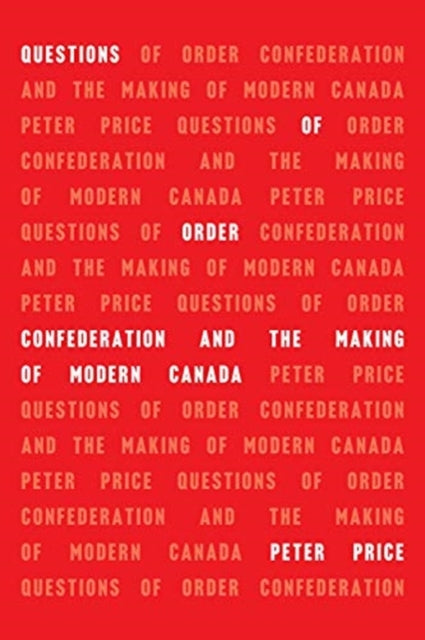Cary Boucock
Questions of Order: Confederation and the Making of Modern Canada
Questions of Order: Confederation and the Making of Modern Canada
YOU SAVE £2.15
- Condition: Brand new
- UK Delivery times: Usually arrives within 2 - 3 working days
- UK Shipping: Fee starts at £2.39. Subject to product weight & dimension
Bulk ordering. Want 15 or more copies? Get a personalised quote and bigger discounts. Learn more about bulk orders.
Couldn't load pickup availability
- More about Questions of Order: Confederation and the Making of Modern Canada
Canadian Confederation has long been assessed as a political moment that created a new "national" entity. This book breaks new ground by arguing that Confederation was an imperial event that generated new questions and ideas about the future of global political order.
Format: Paperback / softback
Length: 226 pages
Publication date: 16 December 2020
Publisher: University of Toronto Press
Over 150 years after Canadian Confederation, it seems like a question with an obvious answer. Questions of Order argues that Confederation was not just a political deal struck by politicians in 1867, but a process of reconfiguring political concepts and the basis of political association.
Breaking new ground, Questions of Order argues that Confederation was an imperial event that generated new questions, concerns, and ideas about the future of political order in the British Empire and the world. It traces how for many public writers in English Canada, Confederation became an important basis for reimagining political order in the empire and redefining basic political concepts. To some, it marked a clear step in the larger project of imperial federation or even the ultimate union of the English-speaking world. For others, however, it represented the certain fragmentation of the empire into sovereign national states.
Set in the context of a time of enormous social and cultural change, when so many long-held assumptions and firmly believed truths were faltering in the wave of new scientific and philosophical beliefs, the creation of Canada forced writers and public thinkers to grapple with the nature of political association and attempt to find new answers to critical questions of order.
The creation of Canada in 1867 was a significant event in the history of the British Empire. It marked the formation of a new nation-state, bringing together the provinces of Ontario, Quebec, and Nova Scotia. The Confederation was a political agreement between these provinces and the British government, designed to promote economic and political cooperation among the colonies.
One of the key aspects of Confederation was the creation of the Canadian Parliament, which was modeled on the British Parliament and consisted of a House of Commons and a Senate. The Parliament was given the power to make laws and regulate trade between the provinces, as well as to represent the interests of the Canadian people in the British government.
Another important feature of Confederation was the establishment of a federal government, which was responsible for managing the national economy and providing services such as healthcare and education. The federal government was also given the power to negotiate with other countries and to protect Canadian interests abroad.
Despite the benefits of Confederation, there were also criticisms of the system. Some critics argued that the federal government was too powerful and that it was undermining the power of the provinces. Others argued that the system was too decentralized and that it was difficult to coordinate policies between the different levels of government.
In conclusion, the creation of Canada in 1867 was a significant event in the history of the British Empire. It marked the formation of a new nation-state and the establishment of a federal government. Confederation was a complex and multifaceted system that had both benefits and criticisms. While it was a significant step towards greater political unity and cooperation among the colonies, it also raised questions about the balance of power and the role of the federal government in a decentralized system.
Weight: 406g
Dimension: 152 x 228 x 19 (mm)
ISBN-13: 9781487522186
This item can be found in:
UK and International shipping information
UK and International shipping information
UK Delivery and returns information:
- Delivery within 2 - 3 days when ordering in the UK.
- Shipping fee for UK customers from £2.39. Fully tracked shipping service available.
- Returns policy: Return within 30 days of receipt for full refund.
International deliveries:
Shulph Ink now ships to Australia, Belgium, Canada, France, Germany, Ireland, Italy, India, Luxembourg Saudi Arabia, Singapore, Spain, Netherlands, New Zealand, United Arab Emirates, United States of America.
- Delivery times: within 5 - 10 days for international orders.
- Shipping fee: charges vary for overseas orders. Only tracked services are available for most international orders. Some countries have untracked shipping options.
- Customs charges: If ordering to addresses outside the United Kingdom, you may or may not incur additional customs and duties fees during local delivery.


